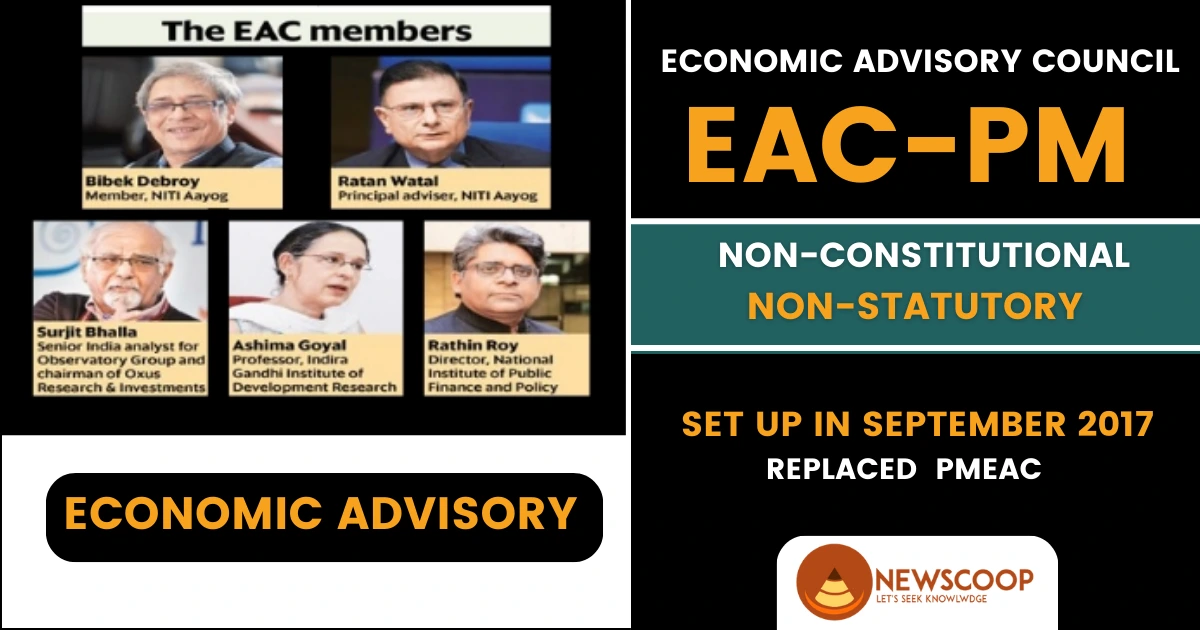The Economic Advisory Council to the Prime Minister (EAC-PM) is an independent body established to provide expert advice and recommendations on various economic issues to the Prime Minister of India.
The EAC-PM plays a crucial role in shaping India’s economic policy, ensuring sustainable growth, and fostering economic development. This article explores the role, composition, functions, and significance of the EAC-PM.
Economic Advisory Council
The Economic Advisory Council to the Prime Minister (EAC-PM) is an independent body that operates outside constitutional and statutory regulations. It was established through an executive order, giving it flexibility and independence in its operations.
The main role of the EAC-PM is to provide advice and recommendations to the Prime Minister on economic matters. It ensures a neutral perspective, free from political biases, to assist in informed decision-making.
The EAC-PM comprises renowned economists, academicians, and professionals with diverse expertise in economics. Their extensive experience and knowledge contribute to the council’s independence and the delivery of well-informed advice.
Objectives & Functions of the EAC-PM
- Policy Formulation: The primary objective of the EAC-PM is to offer timely and relevant policy advice to the Prime Minister on various economic matters, ensuring informed decision-making.
- Evidence-Based Analysis: The council conducts rigorous research and analysis to assess current economic trends, challenges, and opportunities, providing data-driven insights for policy formulation.
- Sector-Specific Recommendations: The EAC-PM provides sector-specific recommendations to optimize resource allocation, improve productivity, and foster growth in key areas such as agriculture, manufacturing, infrastructure, and services.
- Long-Term Planning: The council assists in formulating long-term economic plans, addressing structural reforms, and identifying potential areas for growth and investment.
- Monitoring and Evaluation: The EAC-PM monitors the implementation and impact of economic policies, regularly assessing their effectiveness and suggesting modifications when required.
Nodal Agency & Administrative Support
NITI Aayog’s Role: The NITI Aayog serves as the Nodal Agency for the EAC-PM, providing administrative, logistic, planning, and budgetary support. It helps coordinate the activities of the council and ensures its effective functioning.
Collaborative Approach: The EAC-PM and the NITI Aayog work together in a collaborative manner, ensuring smooth coordination between the advisory council and the government. This collaboration facilitates the implementation of recommended policies and measures.
Chairman & Members of the EAC-PM
- The EAC-PM is chaired by a renowned economist appointed by the Prime Minister.
- The Chairman holds a prominent position and leads the council’s activities.
- The council usually consists of 5-10 members, ensuring a balanced representation.
- The members of the EAC-PM include academicians, economists, and industry experts.
- Each member brings their unique expertise and perspective to the council.
- The members collaborate with the Chairman to analyze economic issues and provide recommendations.
- Their collective knowledge and experience contribute to informed decision-making by the Prime Minister.
Advisory Functions of the EAC-PM
Economic Policy Advice: The EAC-PM advises the Prime Minister on a wide range of economic issues, including fiscal policy, monetary policy, industrial growth, trade, and investment. Its recommendations help shape the government’s economic policies and strategies.
Inflation Monitoring and Control: The council provides insights and suggestions on tackling inflationary pressures, maintaining price stability, and ensuring the effective functioning of monetary policies.
Microfinance and Financial Inclusion: The EAC-PM offers guidance on promoting microfinance initiatives and policies that foster financial inclusion, empowering marginalized sections of society and stimulating economic growth.
Industrial Output and Productivity: The council advises on strategies to boost industrial output, enhance productivity, and promote innovation, aiming to strengthen India’s manufacturing sector and make it globally competitive.
Employment and Skill Development: The EAC-PM provides recommendations to the government on policies that promote job creation, enhance employability, and facilitate skill development initiatives, ensuring inclusive growth and reducing unemployment.
Conclusion
The Economic Advisory Council to the Prime Minister (EAC-PM) plays a pivotal role in shaping India’s economic policies, fostering sustainable growth, and promoting inclusive development. With its diverse expertise, evidence-based analysis, and sector-specific recommendations, the council assists the government in making informed decisions and implementing effective economic reforms.
The EAC-PM’s impact extends beyond national boundaries, influencing international economic engagements and enhancing investor confidence. By addressing challenges and identifying opportunities across sectors, the EAC-PM contributes to India’s journey toward becoming a globally competitive and inclusive economy.
Thank You!





